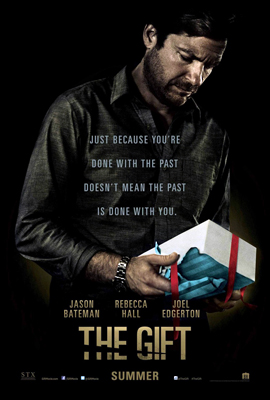 I really enjoyed “The Gift,” a suspense thriller that reminded me a lot of one of those good hour-long “Alfred Hitchcock Presents” TV episodes from the ‘60’s. If you’ve never seen an “Alfred Hitchcock Presents” episode, I’ll explain.
I really enjoyed “The Gift,” a suspense thriller that reminded me a lot of one of those good hour-long “Alfred Hitchcock Presents” TV episodes from the ‘60’s. If you’ve never seen an “Alfred Hitchcock Presents” episode, I’ll explain.
To provide competition for CBS’s success with “The Twilight Zone,” NBC decided to create its own anthology series that focused more on suspense than sci-fi. Their answer was “Alfred Hitchcock Presents” hosted by the ‘Master of Suspense’ himself, Alfred Hitchcock. What made “Presents” different from “Zone” was depicting more humanistic dramas than “Zone’s” penchant for other-worldly entities invading ordinary life. “Presents” episodes focused on the criminal aspects of the human condition- namely murder, theft and betrayal. What both series had in common was their goal to end each episode with the plausibly ironic or unsettling ending that would endear themselves to their viewer. While “Zone’s” endings felt like a surprise punch to the gut, “Presents” built slowly towards endings that were not only plausibly surprising but, in dealing with our human faults, made these endings all the more creepy and disturbing. Unlike “Zone’s” showy stage, “Presents” showcased actors in a stage both efficient and sparse- more like an episode of “Playhouse 90” that felt like you were watching a Broadway play. “The Gift” has all of that efficient staging and showcases actors in a story built on our humanistic faults of malice and revenge; its effectiveness is its culmination to a conclusion that leaves its viewer plausibly surprised, unsettled and disturbed.
“The Gift” sucks you into its efficiently ordinary stage: young married couple Simon and Robyn (Jason Bateman and Rebecca Hall) relocate to a new house for hubby’s new job. They don’t have kids but are working on it; their proxy kid being a lovable dog named Bojangles. The new job has brought Simon back to the area where he grew up and, while buying furnishings for their new house, Simon runs into Gordo (Joel Edgerton). After 20 years, Gordo recognizes Simon from high school; Simon doesn’t recognize Gordo. Simon suddenly remembers and greets Gordo warmly. Simon wishes Gordo all the best as he and Robyn leave the store; Simon confides to Robyn that he doesn’t know Gordo. The next day, a housewarming gift arrives at their door- a bottle of wine with a note from Gordo. How did Gordo know where they live? Obviously from the address left at the store for delivery of their new furnishings.
Gordo stops by the house again, only this time Robyn’s home alone as Simon’s at work. Gordo bestows yet another housewarming gift- fish food (Gordo has taken the liberty to stock their empty coy pond with fish). Even after inviting Gordo to stay for dinner, Simon is understandably disturbed at Gordo’s impromptu visits while his wife is home alone. After respectfully asking Gordo to stay away, Simon and Robyn receive a note from Gordo. The note infers that Gordo was ‘willing to let bygones be bygones.’ Robyn doesn’t understand what this means as Simon said he did not know Gordo. After the fish in the coy pond are found dead and Bojangles disappears, Robyn is forced to understand.
While set up like it’s another psychotic stalker tale, “The Gift” provides more. Just as last year’s “Gone Girl” was set up to be the mystery of a woman’s disappearance and possible murder but wound up being the study of a sociopath, so does “The Gift” delve into retribution for past sins and provide an examination into our human psyche. In creating a story both sparse and efficient, debut writer/director Joel Edgerton (better known for acting roles in “Warrior” and “Exodus: Gods and Kings”) uses this to magnify our faults and showcase his actors. While he and Rebecca Hall deliver their usual good performances, the real standout is Jason Bateman. Bateman, known more for his comedic work in films like “Identity Thief” or “Couples Retreat,” does a formidable acting job in “The Gift”- he deftly juggles the emotions of a man who wants to appear in control of a situation over which he realizes he’s slowly losing control.
Calling “The Gift” a malice-fueled morality play might seem the simplest definition for this film. However, as “The Gift” illustrates, there are no simple appearances. Without malice, could we ever grasp morality?
I don’t think Hitch would argue with that.
